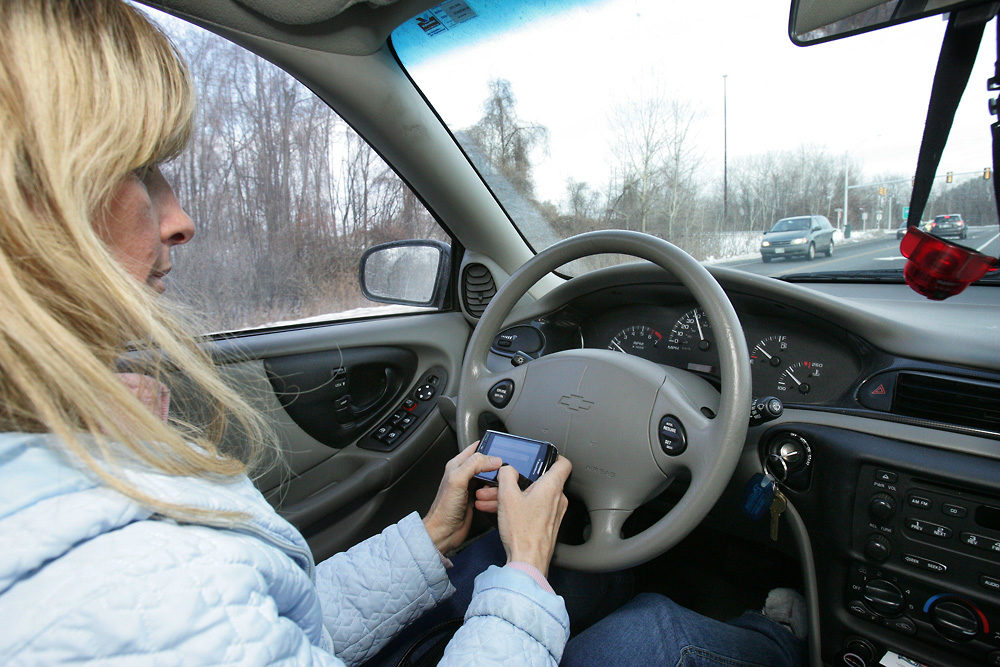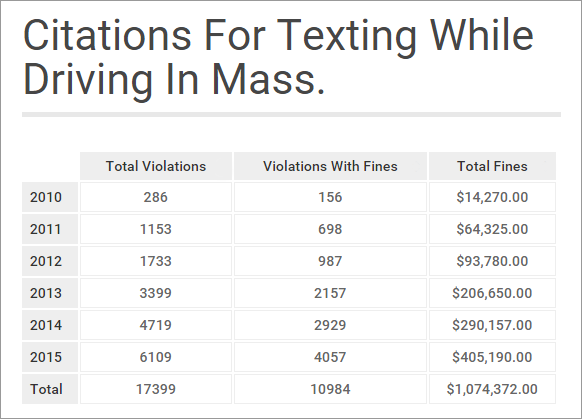Advertisement
Mass. Lawmakers Take Up Bill To Ban Cellphone Use While Driving

You may soon have to put your cellphone down while you drive in Massachusetts -- that means no texting, tweeting or calling.
The state Senate takes up a bill Thursday that would ban all cellphone use while driving. Drivers in Massachusetts are already prohibited from texting while driving under a 2010 law. And teens aren't allowed to use cellphones at all while driving. But some say that law doesn’t go far enough, is too difficult to enforce, and still allows drivers to use their phones in other ways.
Here’s a look at the issue:
What is the current law on cellphone use while driving?
The 2010 law already bans all drivers from using a mobile device to write, read or send electronic messages while driving. The law also bans drivers under 18 from using a cellphone at all. Violators face fines of $100 for a first offense, $250 for a second offense and $500 for a third or subsequent offense.
How is the current law being enforced?
Enforcement of the texting while driving ban has been a point of criticism of the law since it was passed. Officers have to observe the violation to pull you over. Some, including law enforcement officials, have said the law is hard to enforce because it can be hard to tell if a person is texting or trying to place a call. When the law was passed, state officials acknowledged enforcement may not be easy and said they hoped the law would bring awareness to distracted driving, calling texting the “most alarming form of distraction.”
Since the texting-while-driving ban went into effect in September 2010, more than 17,000 citations have been issued, according to the Massachusetts Department of Transportation. The data includes citations issued over a five-year period from Sept. 30 2010 through the end of 2015.
Of those citations, more than 10,000 included fines with a total value of more than $1 million for the five-year period. According to MassDOT, most violators were given $100 fines, but sometimes lower fines of $20 to $50 were issued. As of 2014, the fines also included a $5 surcharge for the state’s public safety training fund.
Advertisement
The number of fines handed out for texting while driving increased steadily over the five-year period. There were 1,153 citations in 2011 (the first full year the ban was in effect), 1,733 citations in 2012, 3,399 citations in 2013, 4,719 citations in 2014 and 6,109 citations in 2015.
However, the numbers appear relatively low compared to tens of thousands of speeding citations issued in Massachusetts each year.
Here is a closer look at the data on texting-while-driving citations (Note: 2010 data includes only the months after the law went into effect):

Sen. Mark Montigny, a New Bedford Democrat, has said he believes mobile phone use is increasing while infractions for texting while driving are low. Montigny heads the Senate Committee on Rules, which is sponsoring the bill to ban cellphone use while driving. The senator could not be reached Wednesday, but he told State House News Service last week that lawmakers "made a mess in 2010 by doing a half-baked law."
All you have to do is get in the car on any given day, a significant number of people are breaking the law and the law is very difficult to prove without subpoenaing phone records. ... No one who is tempted to break the law is really all that troubled by the law as written.
What is the bill being proposed?
The bill (S2093) would take the 2010 law banning texting while driving further. It would prohibit the use of a mobile electronic device while operating a motor vehicle, unless the phone is operated hands-free. The bill says drivers should not "touch or hold the mobile electronic device while operating a motor vehicle except to activate, deactivate, or initiate a feature or function."
The bill says drivers who hold up their cellphones “in the immediate proximity of the operator’s head” will be presumed to be in violation. Violators would face a fine of $100 for a first offense, $250 for a second offense and $500 for a third or subsequent offense. A third or subsequent offense would also be considered a moving violation, which would appear on your driving record and could impact your car insurance rate.
Under the bill, drivers could still use their phones for emergency purposes. Drivers would need to provide evidence to show they used their phone for emergency purposes, such as calling police or the fire department, to report an accident or disabled vehicle or for medical assistance.
A similar bill to ban cellphones while driving is making its way through the House after getting initial approval in November.
Does hands-free mean risk-free for drivers?
It’s known that distracted driving, including cellphone use, can lead to fatal vehicle crashes. This has spurred the U.S. Department of Transportation to run public awareness campaigns urging people to ditch their phones while driving and states to pass strong laws. Forty-six states and the District of Columbia ban texting while driving. Currently there are 14 states and the District of Columbia that ban all drivers from using handheld cellphones, according to the Governors Highway Safety Association, a nonprofit that works to improve traffic safety.
However, there is some research that hands-free devices can still pose risks. Last October, the AAA Foundation for Traffic Safety released a report that found hands-free devices aren't risk-free for drivers. The report found that “hands-free technologies can mentally distract drivers even if their eyes are on the road and their hands are on the wheel” for anywhere from 15 to 27 seconds, depending on the technology used.
